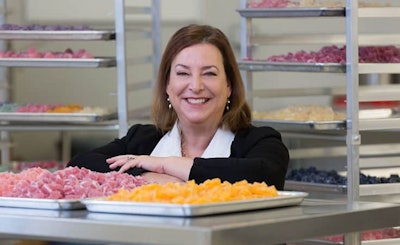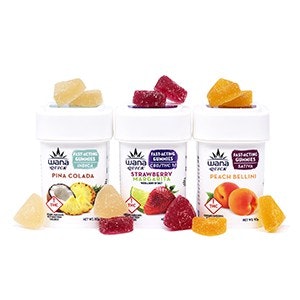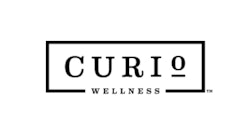
Wana Brands has inked a license and consulting agreement with Indiva to enter the Canadian cannabis market in a partnership that Wana CEO Nancy Whiteman says will help the company preserve its brand while it expands into the global marketplace.
“We have been watching the Canadian market for years and we were holding back, trying to understand the market but really waiting until [Cannabis] 2.0 came on board [with] the edibles and concentrates,” Whiteman told Cannabis Dispensary. “Canada is obviously a very interesting and attractive market. It’s 38 million people and [cannabis is] federally legal, and of course they’re our neighbors, so it was a natural market to be interested in entering.”
Wana chose Indiva, a Canadian licensed producer that creates cannabis flower, pre-rolls, capsules, oils and edibles products, as its manufacturing partner to produce and sell Wana’s line of edible products in Canada.
The Wana team discussed the opportunity with several LPs, Whiteman said, and ultimately chose Indiva, in part, due to the company’s extreme focus on Cannabis 2.0 products.
“That’s really their focus area, having tremendous expertise in the manufacturing piece of it, which was very much what we were looking for,” she said. “They’re not trying to be all things to all people. They don’t have a multi-million-square-foot cultivation [facility] and they’re not trying to get into the dispensary game. They’re very, very focused on being the best in the area where we need them to be the best.”
Indiva also understood the value of Wana’s brand, Whiteman added, which was another key differentiator. Originally founded in Colorado, Wana has expanded to six additional U.S. states with plans underway to launch in four new markets.
“I think there is some thought with some other companies that brands don’t matter, … and Indiva really understood the power of Wana’s brand and the fact that we have such a large footprint in the United States,” Whiteman said. “They really understood that the reason the brand has been successful is there’s something special about the brand that they could take to Canada and do very well with.”
Wana operates its own production facility in Colorado but has leveraged partnerships in the six other states where it has a presence and is working on solidifying partnerships in the four other markets where it plans to expand. The company has an entire team that focuses only on supporting its out-of-state partners, Whiteman said. This includes not only supporting existing products, but also new product launches, as well.

Wana is currently working on releasing new products, starting with its recently announced Wana Quick line of fast-acting gummies.
“Our Wana Quick technology … uses an encapsulation method that basically takes the THC molecule and encapsulates it, so the body experiences it as a soluble, bioavailable substance,” Whiteman said. “It goes into the bloodstream in 5-15 minutes for most people, … [and] it lasts a short period of time. … One of the things with edibles is they do last for quite a while. Sometimes, people want a shorter experience. And it gives what is known as a Delta-9-THC high, which is the same as what you get from smoking. … It has a lot of interesting technology in it and a lot of advantages. It doesn’t replace the classic edibles, which I also think are wonderful, but it’s a whole other option for people who want a different edibles experience.”
Wana also plans to roll out Wana Wellness Company, a separate entity focused on hemp-derived CBD products.
To ensure product consistency with Indiva—and all of the company’s other partners—Wana brings its partners’ kitchen teams to its Colorado facility for a week of training, and then sends its R&D chefs to the partners’ facilities for a week of additional hands-on training.
“Sometimes we make it unmedicated,” Whiteman said. “The reason for that is confectionary products like gummies are very sensitive to altitude and humidity, so we’re constantly tweaking the product for the environment that’s going to be produced, so that the texture and flavor is exactly the same as what we have in Colorado, or as close as we can get it.”
After the initial onboarding process, the Wana team performs quarterly quality assurance checks, where the company’s QA team visits its partners’ facilities to make sure the products are still meeting Wana’s specs. Production efficiencies are also improved through these check-ins, Whiteman added.
As Wana works through the initial phase of its product launch in Canada, the team is dealing with a few dramatic regulatory differences, as well, she said. First and foremost are Canada’s dosage requirements.
In Canada, the maximum dosage per package of cannabis edibles is 10 mg of THC, Whiteman said. In the U.S., dosage limits vary by state, but most states allow 100 mg of THC per package and allow manufacturers to produce 10 mg gummies.
“The other big difference is Canada uses something called plain labeling,” she said. “Whereas our U.S. products have beautiful [packages] and they’re very colorful [and] eye-catching, the Canadian packaging is very plain. You can put the company logo on it, but that’s about it.”
While Whiteman is not ruling out the possibility of leveraging Wana’s Canadian partnership to expand to other international markets, she said the company’s top priority for the time being is making its Canadian launch a success.
“It’s possible that certain things could happen through a Canadian relationship because it is possible to ship from Canada to other countries where it is federally legal, [but] that’s not under discussion at this point in time,” Whiteman said. “We’re really just focusing on doing the best possible job we can in Canada."

























